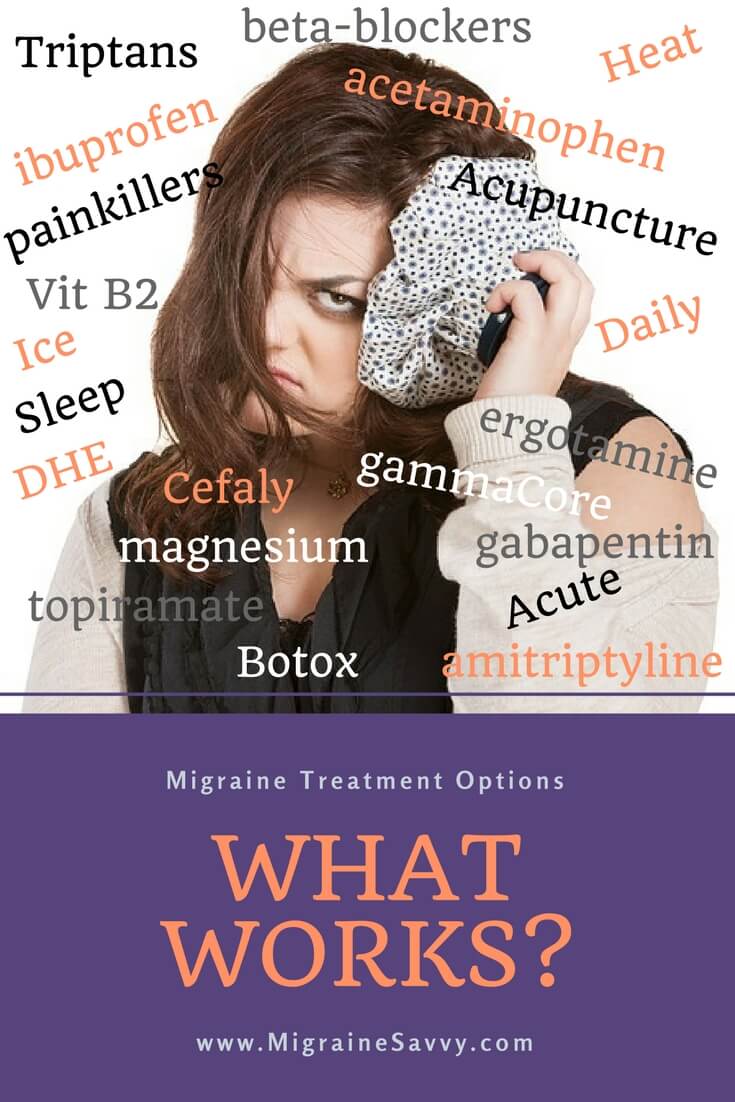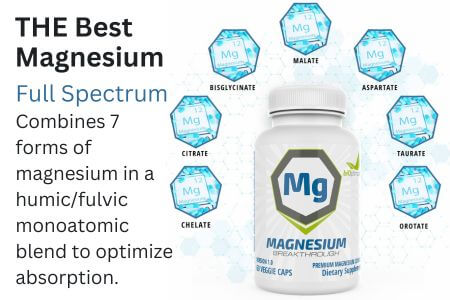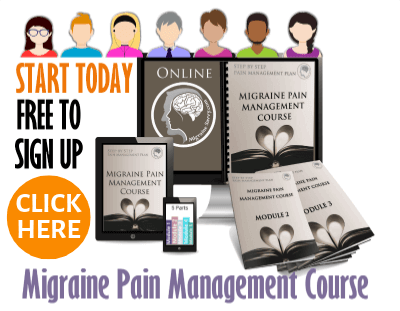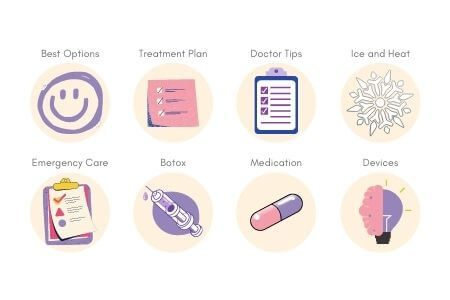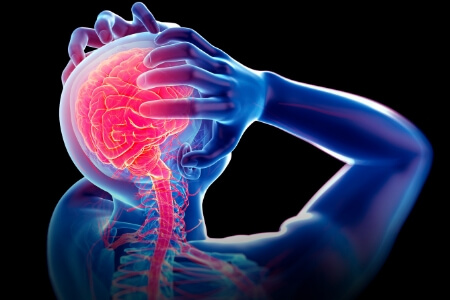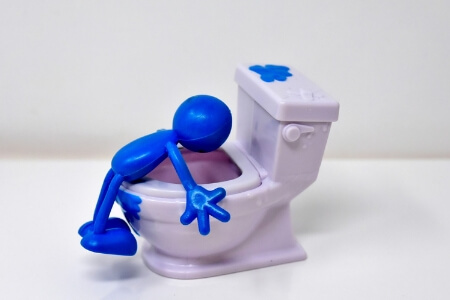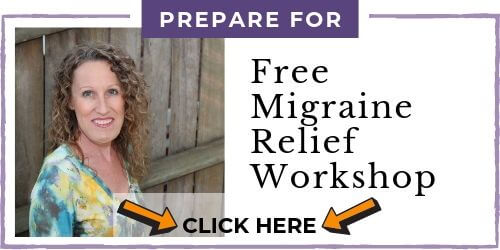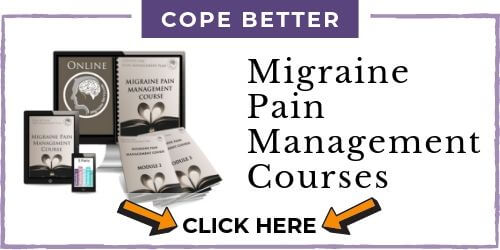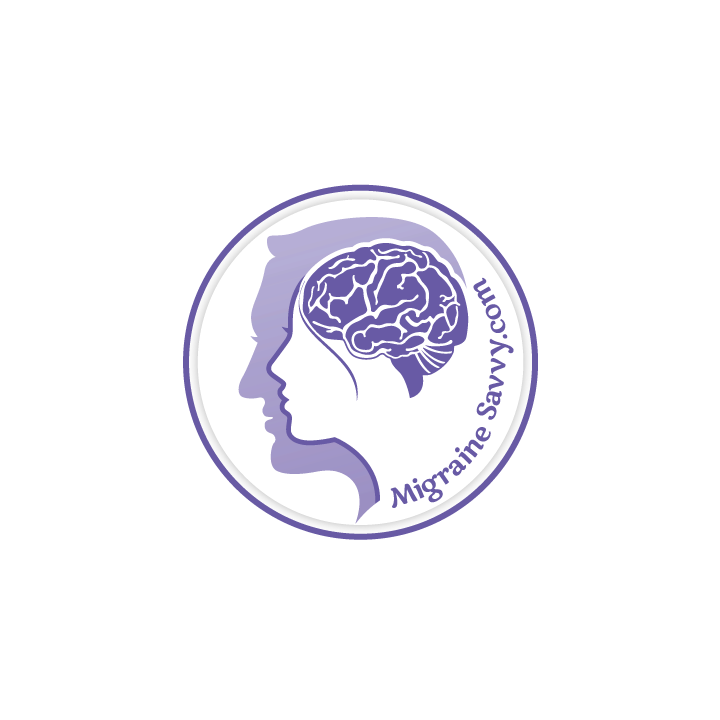- Home
- Migraine Treatments
COMPLETE MAGNESIUM SUPPORT
My Top Choice - Magnesium Breakthrough - The ONLY supplement with all 7 essential magnesium types in one formula. Most only have 1-2 types, leaving you deficient.
Migraine Treatment: Here Are The Best Options
Your migraine treatment options will depend on your diagnosis. There are a number of things to consider like: your health history, what meds you are already on and your unique symptoms.
Plus... you'll need to consider prevention, aborting an acute attack and treating troublesome symptoms.
While triptans have been the most effective medication, your doctor or specialist may suggest other daily prophylactics or acute medications first.
Keeping a headache journal is essential. Your doctor will ask you to keep track of everything you do. Everything you eat, when your migraines hit, how long they last, and anything else you can think of that may be related to the cause of your headaches is important.
When compiling your diary, also include anything you have tried to ease the pain, and how well those pain relievers or techniques worked. Plus, it will help you learn to be able to recognize any patterns when a migraine headache might strike.
This is a good first step to take so you can be better prepared for your doctor too. Oh - and get to your doctor ASAP.
Migraines are not just the headaches themselves. The headache is the most painful and most noticeable phase, but there are four phases in total and many other symptoms related to the condition. You can read about that here - Complex Migraine: The 4 Phases.
The other symptoms can be quite similar to common ailments that everyone experiences at one time or another like: a sinus attack, head cold and runny nose, fatigue, food cravings, blurry vision and or unexplained bouts of mood swings.
The intense pain phase, however, will not be similar! The stand out symptoms for me are nausea, vomiting, vertigo, cognitive impairment (can't speak or find my words) and head splitting pain.
In order to treat your migraines effectively, you will also need to treat your symptoms.
How Do You Get Rid of a Migraine?
Finding the right, most effective, migraine treatment can be a bit of trial and error, I am sorry to say. There is no one size fits all when it comes to migraines.
But using ice and heat at the same time can help abort an attack if you catch it fast enough. This article is essential reading here at Migraine Savvy...
Essential Reading - How to Treat a Migraine with Ice and Heat at the Same Time.
Here are some treatments and tips to help reduce or completely eliminate your attacks:
My #1 Choice in Magnesium Supplements
Reducing the Risk of an Attack Versus Stopping an Attack
Reducing the risk of another attack is different to stopping an attack. One is about making lifestyle choices which you have control over.
And the other is more about taking action immediately like: taking your abortive medications and using your comfort aids at the exact time you need to.
Prevent vs Abort!
Avoiding migraine triggers will not necessarily prevent every migraine, but that is the first course of action I think we take instinctively. I never need to eat chocolate again, that's for sure. Anything you can do to reduce the risk of an attack will help.
In order to reduce the number of migraine headaches you have, I believe it is crucial to make some lifestyle changes, if you haven't already.
It's very important to try to reduce stress at work and at home, eat at the same time every day and to sleep the same number of hours every night.
Sticking to a strict routine is never easy. Some days you may experience more stress, which could trigger a migraine headache, resulting in a poor night's sleep or poor eating habits - decreasing your migraine trigger tolerance.
Maintaining a regular exercise program will also help keep your eating and sleeping habits regular, as well as reduce stress.
When your body is well fed, well rested and well toned, you increase your migraine trigger tolerance and are able to deal with minor upsets more easily.
Other relaxation techniques such as meditation, yoga and biofeedback techniques can also be very helpful. If none of these methods ease the pain or lessen the frequency, your doctor may suggest medication as the migraine treatment for you.
Discuss The Best Migraine Medications With Your Doc
Migraine medication falls into two basic categories: abortive and prophylactic.
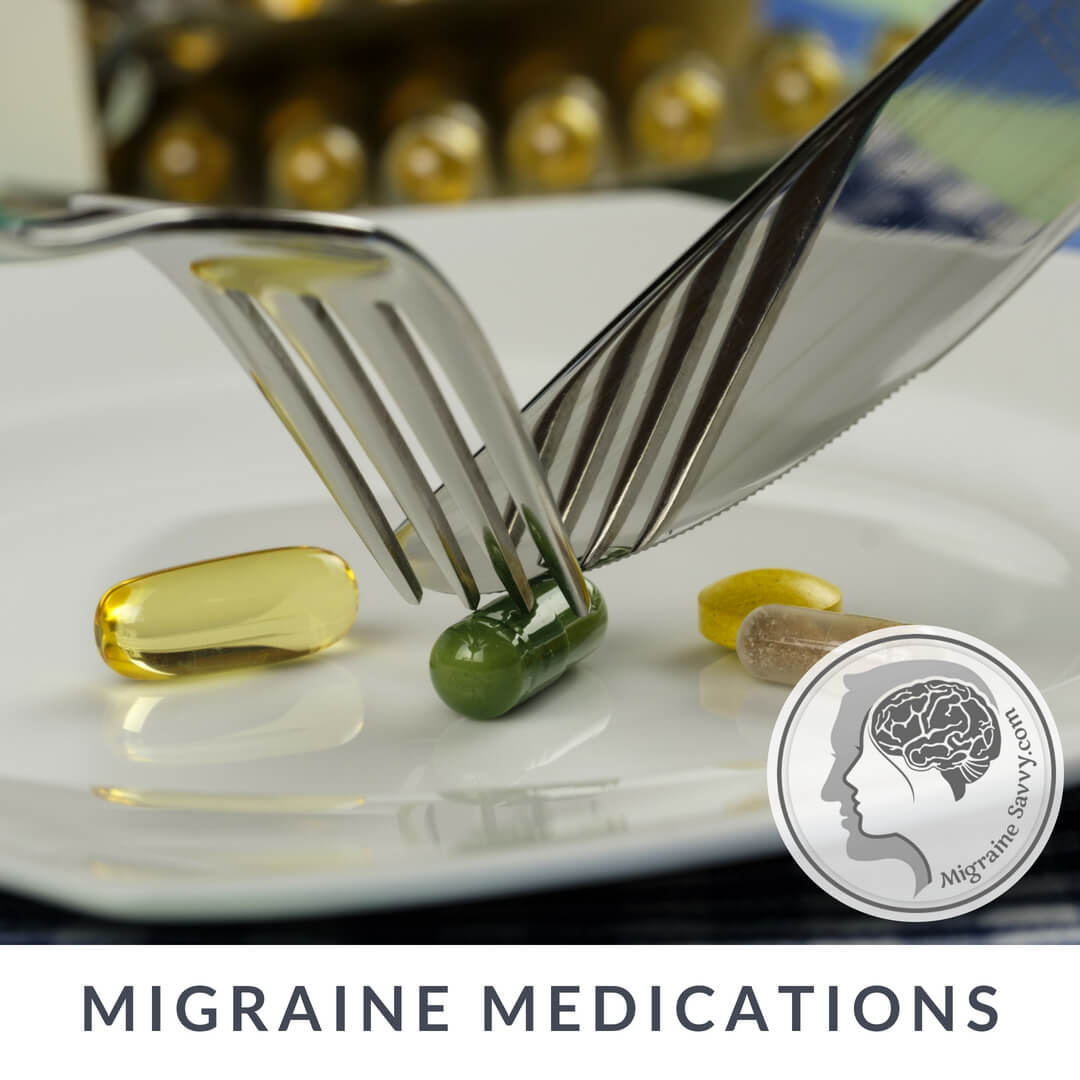
Which type you are prescribed will depend on the severity of your attacks, how often they occur and other medical problems you may have.
You might like to read one of these articles before deciding on your migraine treatment:
Here Are Some Abortive Migraine Medications To Consider
- Over the counter painkillers containing either ibuprofen, acetaminophen, ASA or naproxen, usually used for mild to moderate headaches.
- Ergot formulations such as ergotamine or dihydroergotamine (DHE) which prevent blood vessels from swelling.
- Triptans, such as eletriptan, frovatriptan, almotriptan, rizatriptan, sumatriptan and naratriptan, which imitate the chemical pain messenger, serotonin, and constrict blood vessels to reduce headache pain.
- Sometimes metoclopramide (treats nausea), chlorpromazine (treats mental issues), prochlorperazine (decreases brain hyperactivity), and dimenhydrinate (controls nausea) medications are used.
My #1 Choice in Magnesium Supplements
Prophylactic Medications Might Help You Stop Your Attacks
- Medications developed to prevent seizures such as topiramate, gabapentin, divalproex sodium and valproic acid, which may prevent hypersensitivity in the brain and stabilize the nerves that trigger a migraine.
- Medications developed to control blood pressure such as beta-blockers, which stabilize blood vessels.
- Vitamins, in particular riboflavin (vitamin B2), coenzyme Q10, or magnesium (glycinate), which is the common migraine treatment for people concerned about the side effects associated with medication.
- Pizotifen, a serotonin blocker has proven effective in some cases.
- Tricyclic antidepressants such as nortriptyline and amitriptyline work to suppress the pain and increase brain chemical levels.
- The latest CGRP drug to help is - Erenumab for Migraines.
Doctors consider reducing the frequency, intensity and duration of a migraine attack as successful treatment, not complete elimination.
Preventive migraine treatments are considered effective if the frequency or severity is reduced by at least 50 percent.
So, even though migraines can not be cured... yet, you will be able to deal with the episodes better once you get a good pain management plan in place. I broke it down step by step in my migraine pain management course. Have a look, the first module is free.
Here Are Some Evidenced Based Treatments That Could Help
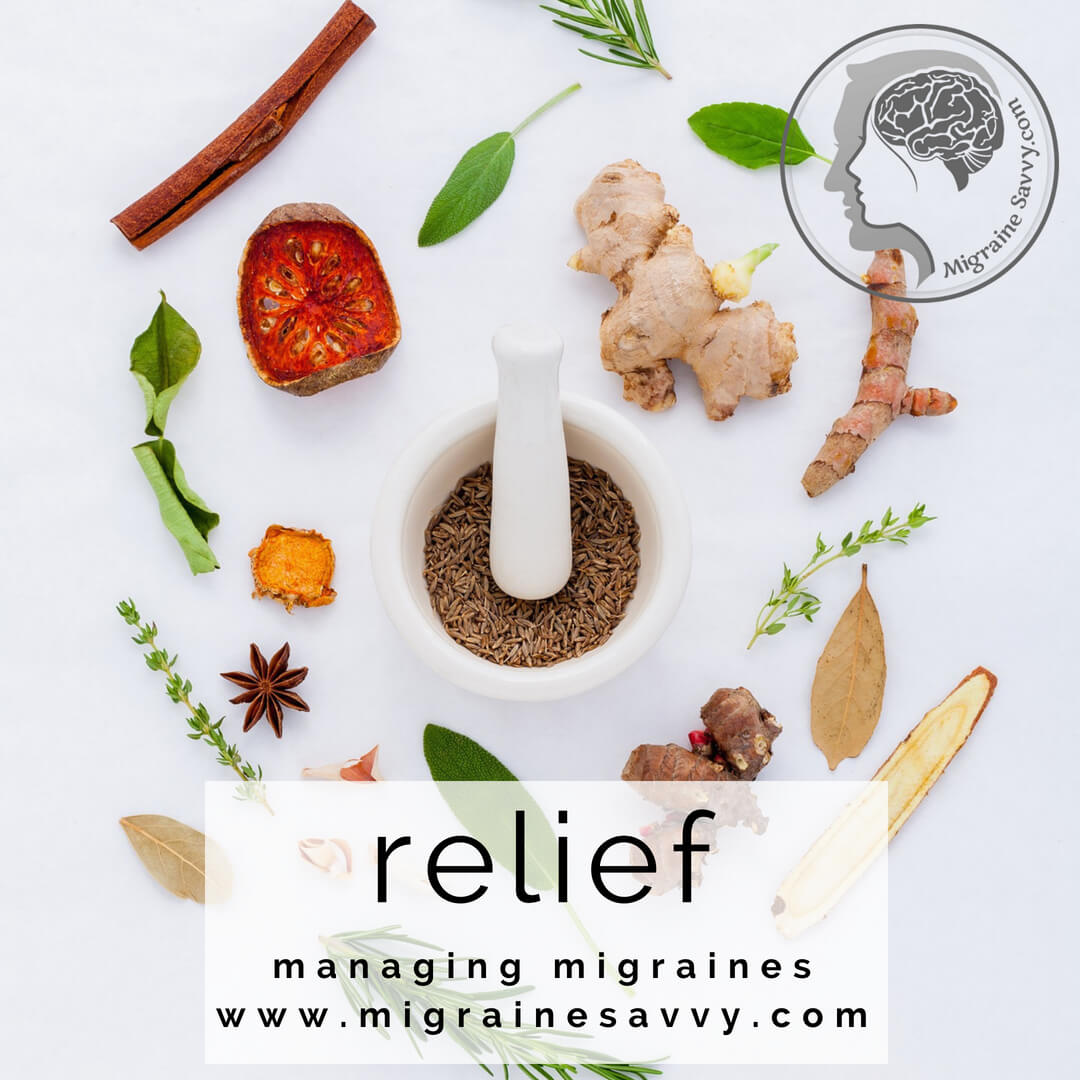
These have some really great evidence behind them:
- Studies done on Butterbur prove it effective as some top migraine medications to prevent the frequency of migraines.
- Relaxation techniques and biofeedback help you control stress.
- Behavioral therapies like CBT that involves avoiding the behavior known to trigger a migraine attack, such as poor sleep habits and not eating properly.
Prevention is often recommended as the number one migraine treatment, or treatment for any ailment, but this is not as easy as it sounds.
If you have pinpointed every trigger you have ever experienced and are able to avoid these triggers, you may be able to reduce the frequency, but preventing every migraine attack is highly unlikely. Also, triggers can change over time as your hormones or allergies change.
Botox has been found effective for chronic migraine sufferers, but not for episodic migraines. Chronic migraines occur more than once per month, while episodic migraines occur a few times per year.
Episodic migraines can be more difficult to treat, because you never know when one might strike, whereas chronic migraines are bit more predictable. For example - occurring during a woman's menstrual cycle when estrogen levels are at their lowest.
I've written about Botox here:
Do You Prefer A More Natural Migraine Treatment?
Butterbur root (Petasites hybridus) is often recommended to people with chronic migraine headaches since it is a preventive treatment.
You may find it effective if you:
- Have frequent attacks – more than two per month with disability lasting three or more days;
- Experience recurring migraines that significantly interfere with daily routines;
- Overuse pain medications – more than twice a week;
- Pain medications are ineffective, or not tolerated.
Acupuncture is often effective for episodic migraines because the pain can be relieved instantly. There is no evidence that “true” acupuncture is any more effective than ‘sham’ acupuncture.
However, both types give greater relief than routine care, and patients experience fewer adverse side effects than with prophylactic medication treatment.
Relaxation therapies such as chiropractic manipulation, relaxation, massage and physiotherapy are considered as effective in preventing migraine attacks as Propranolol or Topiramate. There were some issues with the methods used during research, which left the data inconclusive. Many doctors do not recommend chiropractic treatment to reduce migraines.
My #1 Choice in Magnesium Supplements
Biofeedback uses external instruments to monitor brain waves and pain perception. It is designed to help people become aware of physiological factors in order to help them control migraine triggers and relax.
Neurostimulators are battery powered pulse generators implanted under the collar bone. They send electrical stimulation to the brain.
You can read this post on electric migraine relief (Cefaly and gammaCore) devices for more information.
Are You Desperate For Pain Relief?
In extreme cases, surgery may be the only migraine treatment that works for certain people. The operation involves decompressing certain nerves around the brain and head. Please read this guest post - Nerve Decompression Migraine Surgery.
Doctors will usually try all other methods before resorting to surgery.
Until next time,
WANT MORE TIPS? Subscribe to my newsletter and follow along on Facebook and Pinterest for all of the latest updates.
MIGRAINE TREATMENTS Related Articles
How to be more MIGRAINE SAVVY right now...
